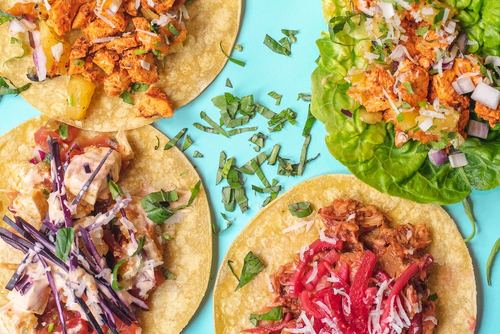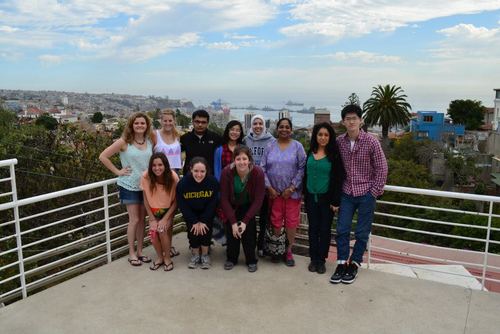There are foods all over the world from different locations and cultures that can keep your teeth and body happy. But which are some of the best to sample?
Countries with some of the best diets and foods include Greece, Israel, Japan, India, Thailand, Korea, Vietnam and Spain. These foods can be sampled in these countries, or in destinations around the world, and there are so many things to add to your foodie bucket list.
If you concerned with your personal hygiene and, most importantly, a foodie, our list of foods to sample will really wet your appetite.
Check out our list of the most health foods to try next time you hit the road.
1. Strawberries
Who doesn’t like strawberries? The very first strawberry garden was located in France but now this popular fruit can is grown all around the world.
But why are strawberries so good? According to Dr. Sonal Bhoot, a dentist from Lee’s Summit, MO - “Strawberries are rich in malic acid. Dry mouth due to reduced salivary flow can be treated with this. Adequate flow of saliva is important for maintaining the oral environment’s pH balance, to prevent cavities, protecting mucosal breakage, and washing off infections. Strawberries rich in malic acid can bring about this protection naturally. Malic acid also helps whiten the teeth and, with whiter teeth, allows you to smile brighter and with more confidence.”
If ever you visit France, or a country with an agriculture industry, try to go fruit picking to taste some homegrown strawberries. Farms around the country welcome tourists to visit, pick and buy fruit when in season.
2. Salmon
If you’re big on seafood, then salmon is one of the best fish to include in your diet. Although salmon can be brought in most countries, it is native to the North Atlantic and Pacific oceans. A trip around these areas would be incomplete without tasting some of the local fresh salmon.
According to a Leawood, KS dentist, Salmon has many health benefits, these fish are a rich source of vitamin D and calcium. They help strengthen bones and teeth. 96% of enamel is made of organic elements like calcium and phosphate, without which the tooth would have no value.
3. Onions
Onion is a surprising tooth-friendly food item and one you might not think would make our list. Onion is believed to have originated in Central Asia, however, it is widely used all over the continent/world. Visit countries like India and you will be treated to some delicious dishes containing onions.
Onions are healthy because they contain antibacterial properties. Though they can make you cry while cooking them, onions help your teeth and gums. The mouth is the major host for microbes, and onions can help kill these virulent species. Your teeth and gums are prone to bacterial attack, and the antibacterial Sulphur compounds present in onion can protect them.
4. Yogurt
Although yogurt is available worldwide nowadays, its ancient flavor is unique to Turkey. Why not make a trip from east to west, experience Turkish ancient culture, and try, as well, some mouth-watering, unforgettable yogurt?
Yogurt is rich in probiotics, a source of natural commensal bacteria, which can create a natural defense to oral health against harmful bacterial attack. This can modulate the host’s immune response and become useful for preventing and treating oral infections, including dental cavities, periodontal diseases of the gums, and malodor. Yogurt is also a rich source of calcium.
5. Almonds
Almonds are native to Iran and surrounding countries. Iran’s almonds are delicious in taste and very healthy in content. Visit Iran for a cultural experience like no other and try the excellent almonds.
Almonds are a rich source of calcium and protein. They help strengthen the bones, teeth, and gums. With rich protein content, gum destruction is well prevented. Almonds are also low in sugar and good for overall health, though their tooth decay prevention properties are the most prominent.
6. Green Tea
Green tea originates in China and there are now so many different flavours, each with unique tastes. Pay a visit to China, a country rich in cultural heritage, to truly experience green tea and also some of the most famous tourist sights in the world.
Green tea is rich in antioxidants. Apart from preventing aging, antioxidants also help prevent gum damage. They have a plaque control property that keeps bacterial growth in check. Green tea is also a rich content of fluoride, which is necessary for cavity prevention. Fluoride is found to act as a natural barrier against tooth decay.
7. Raisins
The United States is the number one raisin-producing nation in the world. Fly to California for a sunbath with a bowl of raisins. You’ll surely long to go again, not just to see celebrities and beaches, but to taste those raisins again.
Raisins are a rich source of phytochemicals, which can kill cavity-developing bacteria and protect the tooth from decay. Raisins don’t have sucrose content, the main culprit for inducing cavities. Phytochemicals protect the gums by eliminating harmful bacteria. As a result, they reduce the risk of gum disease.
8. Garlic
Garlic is native to Central Asia and has long been a common form of seasoning worldwide. It contains a compound called Allicin that has antimicrobial properties, which helps fight tooth decay and gum problems. Garlic can also help lower blood pressure and protect someone’s overall health.
9. Carrots
Europe is the ultimate destination for finding the tastiest carrots out there. Carrots originated in Europe; while visiting, be sure to sample a meal with them for example a traditional Sunday roast in the UK.
Carrots are rich in keratin, which has anti-plaque properties. Keratin helps prevent plaque and calculus deposits, thereby protecting gums and teeth. The high vitamin A content in carrots helps to protect enamel. Eating raw carrots has a cleansing effect on tooth structure.
10. Apples
Apples are of Central Asian origin, and they’re long known to be good for teeth. Apples help neutralize harmful acids in the mouth and they also increase saliva production. Multivitamins present in apples can be helpful for protecting the gums.
11. Celery
Celery originates in the Mediterranean region. If you plan to take a boat trip across the Mediterranean belt, do so along with celery. Chewing celery helps to clean the teeth and massage the gums. It also increases salivary production and neutralizes bacteria.
12. Sesame
Besides wildlife, Africa is also home for sesame. Sesame helps scrub bacteria from one’s teeth. It is also rich in calcium, which strengthens bones and teeth.
13. Chewing gum
One of the most random inclusions on our list, chewing gum is one of the best ways to refresh your mouth and also have fresh smelling breath which other travellers will appreciate.
Sugar-free chewing gum is harmless—an oral-hygiene product you can rely on. It originates from Central America, coming from the Sapodilla tree, which is native to the region, as well as Southern Mexico and the Caribbean. During colonization, the tree was introduced into Asian countries, and it has been growing in larger quantities ever since.
Chewing gum helps maintain the mouth’s pH balance, controlling an otherwise acidic environment and preventing tooth decay. It is also an excellent mouth freshener. Chewing gum can stimulate the salivary glands to speed up saliva production. It can also effectively remove sticky food items that may have gotten stuck on the surface of the tooth, and is thus an efficient cleanser.
14. Cheese
Cheese is an excellent source of calcium and phosphate, both of which are essential elements for the growth and strengthening of teeth. In the modern era, the first successful large-scale production of the cheese plant were launched in Rome and New York, where workers made cheese in an assembly-line fashion.
Since then, it has been a widely used food item in Europe and America. However, in recent decades, where Euro-American culture is predominant, such as in Middle East countries and the Indian subcontinent, cheese has become a favorite food item. We recommend visiting Italy, for some of the best pizzas in the world!
As a rich source of calcium and phosphate, cheese is an excellent food for tooth growth and development. Enamel destruction due to cavities will become slower when it comes to cheesy foods. Cheese also helps balance oral pH levels, which increases the flow of saliva and prevents cavity formation.
15. Water
When travelling anywhere, it is important to take care of yourself and also stay hydrated. Hydration helps wash away microbes, balance oral pH levels, and prevent mucosa. It can also help in warmer climates and keep your body functioning well.
We hope our list have given you some foods to consider eating on your next trip.Combining health with your holiday adventure will offer you the perfect amount of fun, experience, and memories to take away. Plan wisely, and enjoy your trip. Bon voyage!








